Contents
Ready to learn how to sue a company in Alameda small claims court? Learning how to sue a company in Alameda small claims court might seem like a complicated process but in this article, we break down how small claims works!
In this article learn about:
How much you can sue a company for in small claims.
How much going to small claims costs.
The steps to suing in Alameda small claims court.
What to expect during a small claims hearing.
What information you will need when preparing to file the small claims court lawsuit.
How to find the right legal name for a business you are suing in Alameda Small Claims Court.
How much can you sue a company for in small claims?
In Alameda small claims (and any California small claims court), you can sue a business for a maximum of $12,500 if you are an individual. If you are a business suing a business, you can sue for a maximum of $6,250. Note, if you are a sole proprietor, you count as an individual.
By suing in small claims you are agreeing to waive any amount over the maximum amount you can sue for, even if you are owed more. For example, if a business owes you $15,000, and you decide to sue in small claims, you are waiving suing for an additional $2,500.
Benefits of Suing in Small Claims
While you may be missing out on the full amount you are owed, there are practical benefits to suing in small claims instead of suing in "regular court."
Here are some of the benefits:
Court filing fees are cheaper in small claims than in other courts.
The process is faster in small claims than in other courts as your hearing will usually be scheduled 30-70 days after you file the lawsuit.
Lawyers are generally not allowed in small claims which helps keep the costs of suing low.
How much does suing a business in an Alameda County small claims court cost?
So how much are you going to spend by suing in small claims court?
Court Filing Fees
The amount you will pay to file a small claims lawsuit in Alameda County depends on how much you are suing for. You will pay between $30 to $75 to file the lawsuit. If you cannot afford to pay court fees, you can ask the court to waive the fees.
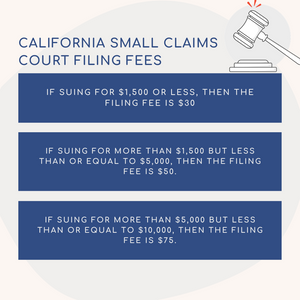
Serving Costs
Once the lawsuit is filed, you have to notify the company you sued that it has been sued. This is called "serving." Serving Costs can range from $0-$75 per company you sue.
If you win, you can request that the company you sued pay for your court fees and serving costs.
Learn More: Full Guide on California Small Claims Court Filing Fees
What are the steps to suing a company in small claims court?
We have outlined each one of these steps in detail, click the links to learn more.
Prepare and file the lawsuit. Learn more.
Notify ("serve") the company you have sued. Learn more.
Prepare for and attend the small claims hearing. Learn more.
Once the lawsuit is filed, the small claims hearing will be scheduled 30-70 days later.
What is a small claims court hearing like in Alameda County?
Small claims hearings in Alameda County are informal and most hearings last around 15 minutes. As of January 2020, Alameda County is conducting small claims hearings virtually. You can learn how to live stream their small claims hearings here.
Who will represent the company at the hearing?
The easiest way to answer this question is that a lawyer will not be representing the company since lawyers cannot represent parties at the initial small claims hearing.
If the company you are suing is a corporation or LLC, they will have a non-lawyer employee representing them at the hearing.
If the business is a sole proprietorship, meaning the business is not incorporated as a corporation or LLC, the owner of the company will represent the business at the hearing. It can be tricky to figure out when a business is a sole proprietorship, more on this in the section below on "fictitious business names."
If you and the company you sued, both show up:
Right before the hearing, the judge will ask you and the company representative to show each other the evidence that you will later show the judge.
The judge will ask you why you are suing.
The judge will ask the company to present their side of the story.
The hearing will last around 15 minutes.
The judge will ask you to show them the evidence you brought. Sometimes the judge will keep the evidence. Other times, you will get the evidence right back.
Very rarely a judge will tell you whether you won or lost at the hearing. Instead, the judge will tell you that their decision will be mailed to you (usually takes a few weeks to two months or so).
If you show up but the company you sued does not show up:
If the company you sued does not show up to the hearing but you properly notified ("served") them, then the hearing will still take place. You don't automatically win and will still have to tell the judge why you should win.
Learn More: What is a Small Claims Court Hearing Like?
Preparing to File Your Small Claims Lawsuit Against a Company
In order to sue a business in an Alameda County Small Claims Court, you need to know:
The correct legal entity name for the business.
Who the "registered agent for service of process" is.
Why is it important to have the correct legal name of the company you are suing?
Be careful when preparing your small claims lawsuit against a business as you need to name the business correctly on the lawsuit. Remember, the name you see on the website or storefront isn't always the complete legal name.
Here are the reasons why you need to have the correct business name:
You might sue the wrong business entity.
If you win your lawsuit and the business you sued does not pay, you may run into issues collecting the money owed to you.
The Alameda Small Claims Court may reject your lawsuit when you file it.
You need to know who to serve.
Read More: Complete Guide on how to file an Alameda Small Claims Court Lawsuit
Who is the "registered agent for service of process"?
Any corporation or LLC that does business in California, has to select a person (or another business) to receive legal documents (like a lawsuit) on their behalf.
This person (or business) is called the "registered agent for service of process" or just the "registered agent."
After the lawsuit is filed, this is the person (or business) who will be notified ("served") of the lawsuit on behalf of the company you are suing.
Read more below on how to find the registered agent.
How to find the correct legal entity name for a business you are suing
Step 1: Make a list of any names the business has used in your interactions with them.
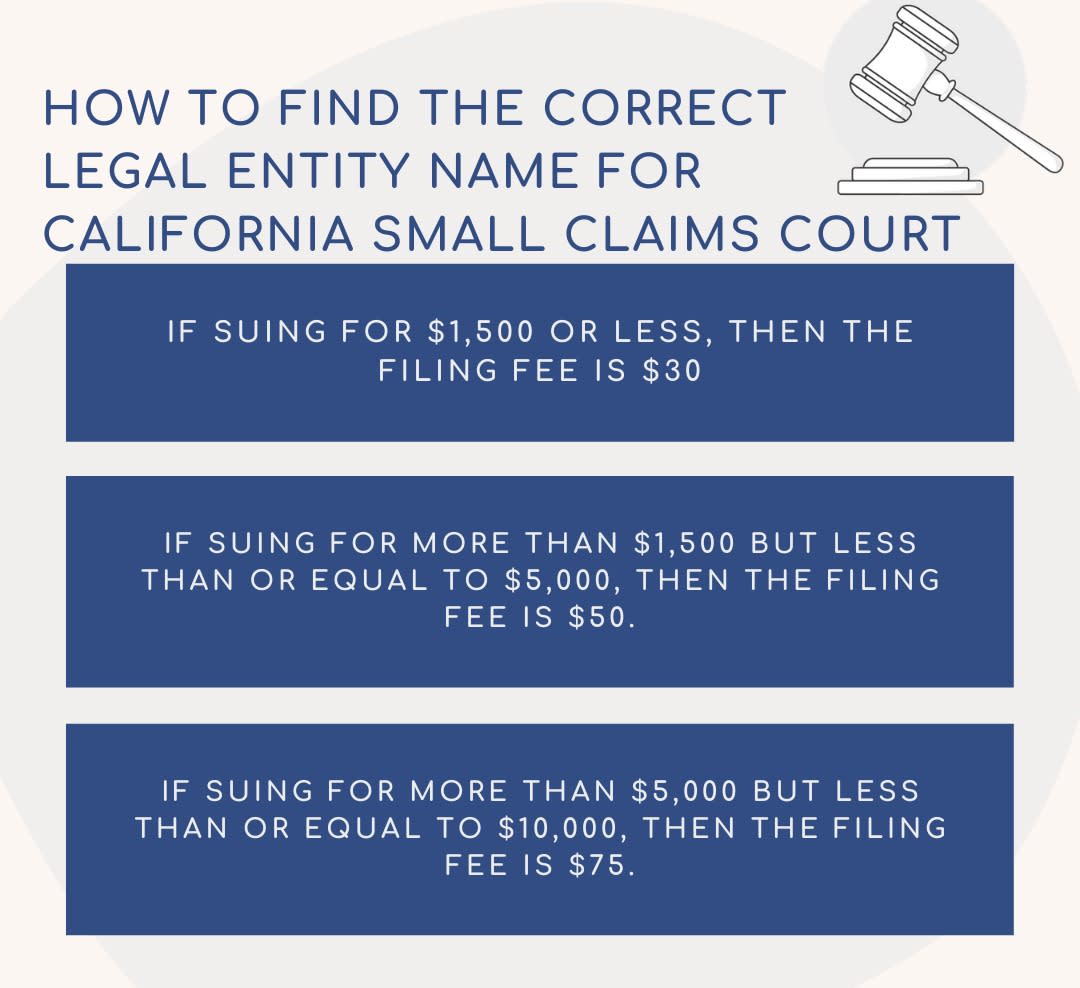
Check the business's website. Sometimes you can find the information in their "privacy policy" or "terms of use" all the way at the bottom of the website.
Any contracts or receipts you may have from the business.
Any communications the business has sent you.
Step 2: Check the California Secretary of State's website
Using the list of names you have created for the business, run a search on the California Secretary of State's website.
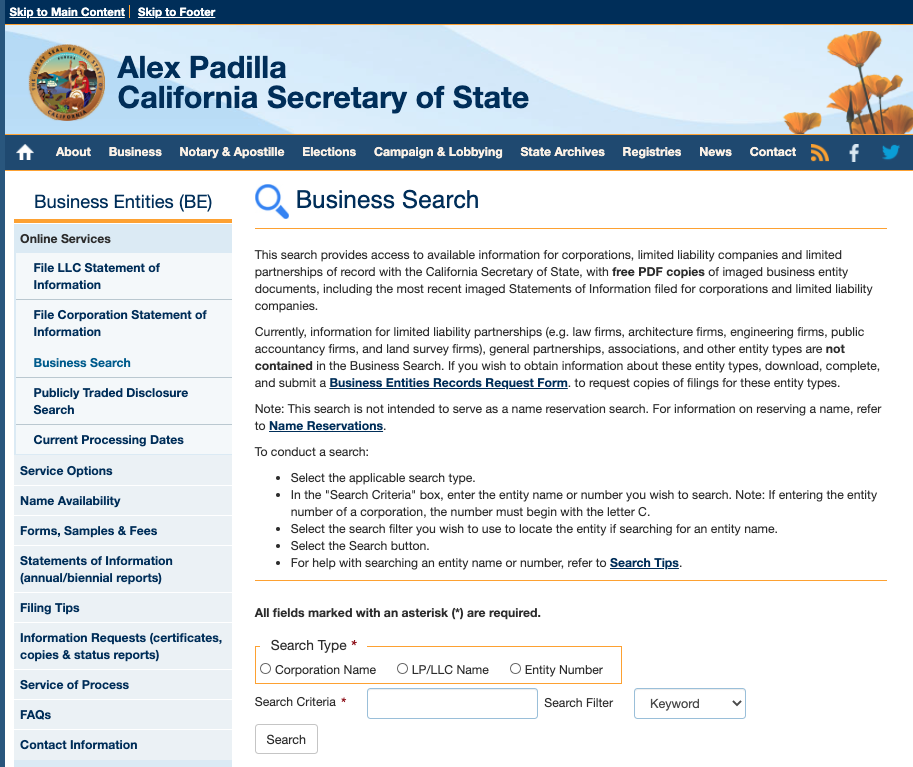
Here are some tips:
If you don't know whether the business is a corporation (the name will usually end in "inc." or have the word "corporation" in it) or LLC (the name will usually end with "LLC"), search by both categories.
If too many similar names come up, you want to click on the word "status" so the results are organized by businesses with "active" status.
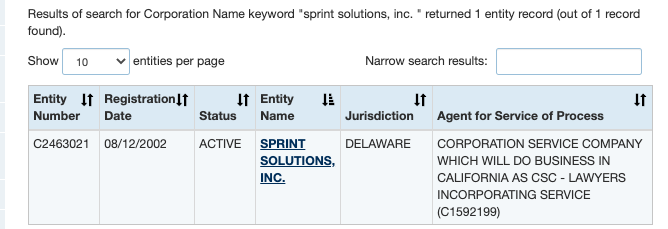
There are many businesses that have similar names so make sure the name you find is as close to one of the names listed on their website.
Make sure to also click on the name of the business under "entity name" and review the addresses. If the addresses are similar to the ones on the website, then you have likely found the correct business name.
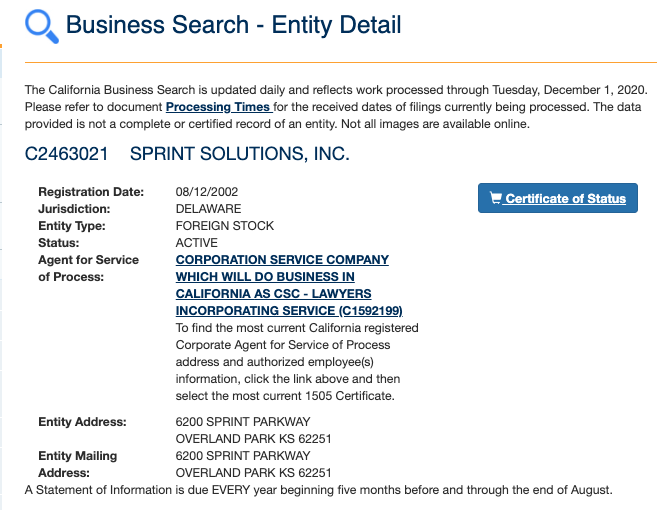
For example, if you were suing Sprint (the phone company) you would have to double-check that "Sprint Solutions, Inc." is the correct legal entity for Sprint (the phone company). Run a quick google search for "Sprint Solutions, Inc." and see if the information you find ties it to Sprint (the phone company) or whether it is a different company.
If no names come up, then run a fictitious business name search in the county where the business is located (see the next section).
Do you need help with your Small Claims Court lawsuit in Alameda County? JusticeDirect can help.
What is a Fictitious Business Name
Sometimes an individual or business will operate using a name other than their legal name. This is known as a:
"fictitious business name"
"FBN"
"doing business as"
"DBA"
California law requires sole proprietors, partnerships, LLCs, and corporations that want to do business using a name other than their legal name to register the name in the county where their principal place of business is located.
How to search for a Fictitious Business Name (FBN) in Alameda County:
Step 1: Go to the Alameda County Recorder's website.
You will be directed to the welcome page.
On the bar menu, click on Fictitious Business Name > Search FBN Index
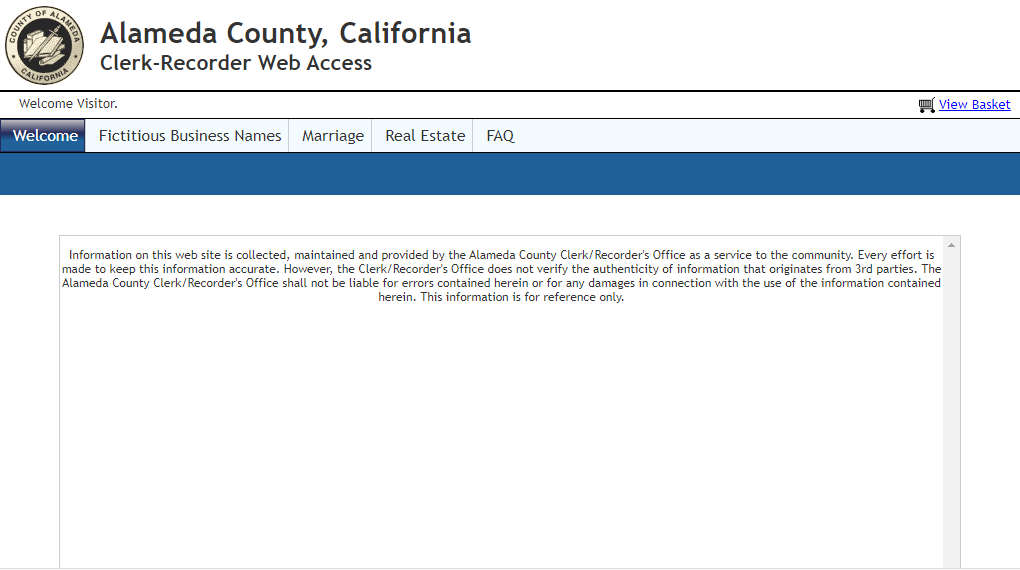
Step 2: Enter the name of the fictitious business name you are searching for and click search.
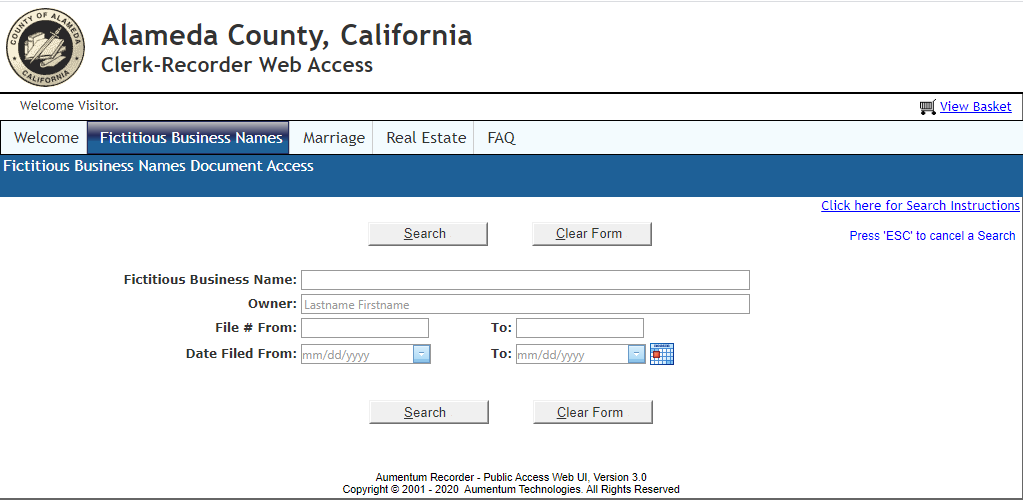
Once you click on "search", you will see a list of results, many times with more than one business that has a similar name.
You will see the legal entity name underneath the fictitious business name.
You can also click the file number on the left side to see more details of the company.
You will find the Legal Entity Name underneath "name".

You may find the name of a person instead of a company. On the main results page, under "Business Type" you can see whether the fictitious business name belongs to a sole proprietor, LLC, or corporation.
If under "Business Type" it lists "Individual" then the business is likely a sole proprietorship which means you are not suing a business but rather an individual.

If the registrant is a corporation or LLC (normally ends in "corp", "inc." or "LLC"), you will want to review the section on searching the California Secretary of State's database listed above to obtain more detailed information on the business and their registered agent. Once you click on "search", you will see the business name results.
Searching using the BBB (Better Business Bureau)
Still can't find the correct legal entity name? Another option is to search on the BBB. If the company has had complaints in the past, then the Better Business Bureau might have looked up the legal entity name.
How to find the right business name on the BBB
Type the business name. If you know the city and state where the business is located, then enter the city and state in the address box. Otherwise, leave it blank and press search.
A list of business names will come up. You may see a different business name than the one you typed. Try clicking on "view BBB review."
Go to the section labeled "Business Details." Determine whether it seems like that is the correct business you worked with by verifying the address. The business may list who the owner is or their correct legal entity name.

Camila Lopez, Esq.
Attorney at JusticeDirect. Camila holds a law degree and is a certified mediator. Her passion is breaking down complicated legal processes so that people without an attorney can get justice.

